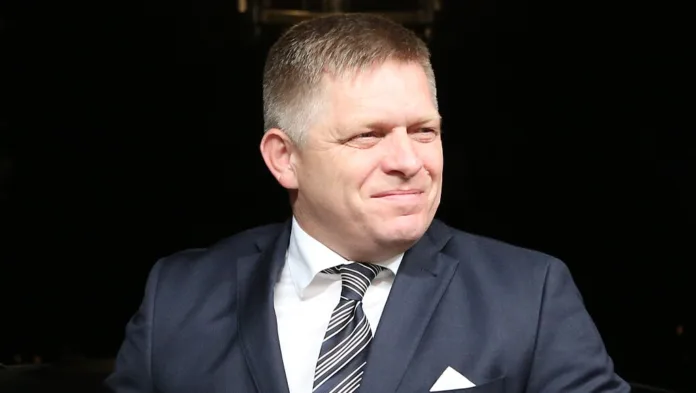Slovak Prime Minister Robert Fico, shot multiple times, is no longer in life-threatening condition
Slovak Prime Minister Robert Fico faced a harrowing assassination attempt that left him gravely wounded on Wednesday. After being shot multiple times following a political event, the 59-year-old leader was rushed to a hospital for emergency surgery. The attack has sent shockwaves throughout Slovakia and Europe, drawing widespread condemnation from international leaders. Despite the severity of his injuries, Deputy Prime Minister Tomas Taraba confirmed that Fico is not in a life-threatening condition and is expected to survive.
Fico, a prominent figure in Slovak politics for decades, has had a contentious career marked by populist and nationalist policies. His recent third term as prime minister has seen Slovakia shift its stance on several key issues, including halting military aid to Ukraine. This decision has sparked significant domestic and international debate, reflecting the polarized nature of his leadership. The shooting incident, which occurred in the town of Handlova, has heightened concerns about political violence in Slovakia, a country with little history of such incidents. As Fico recovers, the nation grapples with the implications of this attack on its political landscape.
AP News :
The AP News article by Justin Spike provides a comprehensive overview of the assassination attempt on Slovak Prime Minister Robert Fico. The report details that Fico was shot multiple times after a political event, an incident that has shocked Slovakia and reverberated across Europe. Deputy Prime Minister Tomas Taraba assured the public that Fico, despite the severe injuries, is expected to survive, as his surgery went well.
The article traces Fico’s political journey, highlighting his beginnings in the Communist Party of Czechoslovakia and his rise to prominence in Slovak politics. Fico, a law graduate, first entered parliament in 1992 and became the chairman of the Smer party in 1999. His political stance is described as left-populist, though comparisons are often drawn to right-wing nationalist leaders like Hungary’s Viktor Orbán.
Fico’s tenure as prime minister has been marked by significant controversy. His pro-Russian and anti-American platform has been a point of contention, particularly his decision to halt military support to Ukraine. This policy shift, alongside efforts to amend the penal code and control public media, has led to widespread protests. Critics fear that Fico’s leadership could steer Slovakia away from its pro-Western trajectory.
The AP report also touches on Fico’s legal troubles, including charges related to creating a criminal group and misuse of power. His government resigned in 2018 amid the fallout from the murder of investigative journalist Ján Kuciak. Despite these challenges, Fico remains a significant figure in Slovak politics, and his recent election victory underscores his enduring influence.
BBC :
The BBC article by Malu Cursino reports that Slovak Prime Minister Robert Fico is no longer in a life-threatening condition after being shot multiple times. Deputy Prime Minister Tomas Taraba informed the BBC that Fico’s surgery was successful, and he is expected to survive. The shooting occurred in the small town of Handlova, where Fico was attending a government meeting.
The article provides a detailed account of the incident, including statements from Defence Minister Robert Kalinak, who initially described Fico’s condition as critical. The suspect, reportedly a 71-year-old writer and political activist, was detained at the scene. Interior Minister Matus Sutaj Estoka characterized the attack as a politically motivated assassination attempt, linking it to the heightened political tensions in Slovakia.
Fico, airlifted to a hospital in Banska Bystrica, underwent several hours of surgery. The shooting has sparked a wave of reactions, with Slovak media reporting on the suspect’s background and possible motives. The incident coincided with parliamentary discussions on the proposed abolition of Slovakia’s public broadcaster, RTVS, which has been a contentious issue.
The BBC also highlights the broader political context, noting Fico’s return to power last year after a period in opposition. His government has adopted a nationalist and populist stance, halting military aid to Ukraine and pushing controversial domestic policies. This political climate, marked by intense debates and public protests, has contributed to the volatile atmosphere leading up to the assassination attempt.
Reuters :
Reuters’ report by Radovan Stoklasa and Boldizsar Gyori provides an in-depth look at the assassination attempt on Slovak Prime Minister Robert Fico. The article confirms that Fico is no longer in a life-threatening condition after undergoing surgery. Deputy Prime Minister Tomas Taraba reassured the public about Fico’s recovery, noting that the operation was successful.
The attack took place as Fico was leaving a government meeting in Handlova. The gunman, identified as a 71-year-old man, shot Fico five times, resulting in serious injuries. Defence Minister Robert Kalinak described Fico’s condition as serious polytrauma, but he is now stable following surgery. Interior Minister Matus Sutaj Estok labeled the shooting as a politically motivated assassination attempt, linked to recent political events in Slovakia.
The Reuters article details the international reaction to the shooting, with condemnation from leaders such as US President Joe Biden and Russian President Vladimir Putin. The incident has shocked Slovakia, a NATO and EU member with little history of political violence. Fico’s administration, marked by a shift in policy towards Russia and away from Western alliances, has been a source of significant controversy.
The report highlights Fico’s political career, including his pro-Russian stance and efforts to dismantle anti-corruption measures. His return to power has been contentious, with policies that have polarized Slovak society. The assassination attempt has further intensified the political climate, drawing attention to the challenges facing Slovakia’s democracy.
